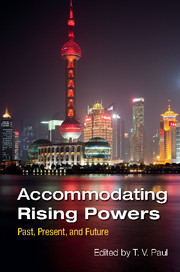Book contents
- Frontmatter
- Contents
- List of figures
- List of contributors
- Acknowledgments
- Part I Mechanisms of accommodation
- Part II Historical cases
- Part III Contemporary cases
- 10 China's bargaining strategies for a peaceful accommodation after the Cold War
- 11 Partial accommodation without conflict: India as a rising link power
- 12 Brazil: revising the status quo with soft power?
- 13 Prospects for the accommodation of a resurgent Russia
- Part IV Conclusions
- Index
11 - Partial accommodation without conflict: India as a rising link power
from Part III - Contemporary cases
Published online by Cambridge University Press: 05 March 2016
- Frontmatter
- Contents
- List of figures
- List of contributors
- Acknowledgments
- Part I Mechanisms of accommodation
- Part II Historical cases
- Part III Contemporary cases
- 10 China's bargaining strategies for a peaceful accommodation after the Cold War
- 11 Partial accommodation without conflict: India as a rising link power
- 12 Brazil: revising the status quo with soft power?
- 13 Prospects for the accommodation of a resurgent Russia
- Part IV Conclusions
- Index
Summary
India's behavior at the global level has changed dramatically from that of a “reclusive porcupine” to that of a rising power that wants a greater role in international organizations, negotiates strongly at the World Trade Organization (WTO), and seeks a permanent membership in the UN Security Council. It not only wants a stronger individual presence in global organizations but hopes to change the rules of the game (International Monetary Fund (IMF) reform, for example), which will also benefit the rise of similar nations. Its policymakers strongly pursue trade and global economic integration. Recent estimates suggest that India may become the fastest growing economy by 2016, overtaking China. By measures of hard power, such as GDP, population, defense spending, and technological innovations, India held about 8 percent of global power in 2010, after the United States, the European Union, and China. India currently spends about 1.98 percent of its GDP on defense, and it has enhanced its military capabilities in the past decade. These changes, together, have led to a closer relationship with United States, as demonstrated by the passage of the United States–India nuclear deal. India claims its place as an Asian power no longer hemmed in by South Asian regional shackles. Many analysts recognize India and China as two strong nations that will reorder the shape of global power. While other scholars are more cautious about India's rising global influence, most agree that India could play a major role in the emerging multipolar global system.
This chapter asks an important question relevant to the shape of the emerging international system: What will be India's impact on the possibilities of peaceful accommodation or conflict in the international system? Will India's strategic behavior create uncertainty, conflict, crisis, or peaceful accommodation? Will we see flashpoints of conflict between India and China, as the two rising powers compete for global prominence and scarce economic resources? Will India assume “meaningful international roles” within the international system? This question is similar to that of whether India will become a “responsible stakeholder” in the international system. This chapter addresses these related questions by analyzing India's preferences and strategies of global engagement and the strategies of accommodation adopted by the United States and the international system.
Most analysts of India's rising power treat the concept of “rising power” in a one-dimensional way.
- Type
- Chapter
- Information
- Accommodating Rising PowersPast, Present, and Future, pp. 222 - 245Publisher: Cambridge University PressPrint publication year: 2016
- 6
- Cited by

